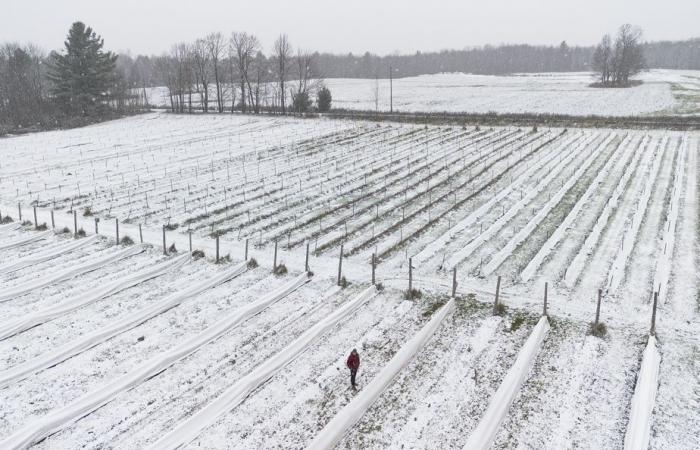A bill modernizes certain regulations for the Quebec wine industry, while imposing constraints on it.
Published yesterday at 9:00 a.m.
Quebec winegrowers will soon have a good reason to toast: Quebec will finally allow them to entrust the delivery of their bottles to a colleague, whereas they currently have to do it themselves. It doesn’t matter the amount of alcohol, it doesn’t matter where their wine goes.
“We have really worked a lot in the last year to move this issue forward,” says Matthieu Beauchemin, co-owner of Domaine du Nival and new president of the Quebec Wine Council which represents the wine industry.
Currently, winemakers must make all wine deliveries themselves — or ask an employee to do so, for larger estates… where there are employees. Which means, in concrete terms, that if a Montreal business is out of stock, the Eastern Townships winemaker must travel to resupply it. If the shortage happens in the middle of the harvest, in the fall, it’s a safe bet that the Montreal store will run out of wine for a while.
The amendment contained in Bill 85, tabled before the holidays, does not live up to the initial demands of producers, but it opens a welcome breach since winegrowers have been asking for years to lift this deemed regulation. archaic.
Initially, producers hoped to be able to outsource deliveries to a third party, such as a delivery company; they will have to content themselves with delivery through another artisanal production holder.
The gain, which may seem small, still satisfies Matthieu Beauchemin.
This allows delivery by someone who also holds an artisanal permit, whether it is another winegrower, a cider grower, a producer of mead, acer, etc.
Matthieu Beauchemin, president of the Quebec Wine Council
The co-owner of Domaine du Nival agrees that this solution will require a little planning, but he believes it will make it possible to break into new markets.
PHOTO OLIVIER JEAN, LA PRESSE ARCHIVES
Domaine du Nival, in Montérégie
“If we have five or ten winegrowers to serve the Gaspésie, that could make sense,” he explains, specifying that regions far from places of production are today often orphaned by several wines. According to him, some winegrowers will be tempted to develop regional routes and transport colleagues’ bottles.
An imperfect solution
This way of doing things, however, places these SME managers in a strange situation, since it forces collaboration between companies which are nonetheless competitors. By entrusting delivery to another vineyard, the producer inevitably reveals sensitive information about his business.
Christopher Skeete, Minister for the Economy and responsible for the file, admits that it is not a perfect solution.
In an interview, he speaks of a compromise, the wine industry being an extremely complex sector of activity to manage.

PHOTO MARCO CAMPANOZZI, ARCHIVES LA PRESSE
The Minister for the Economy, Christopher Skeete
There are a lot of irritants in the alcohol law, we are trying to resolve them. We’re trying to navigate this minefield of alcohol law.
Christopher Skeete, Minister for the Economy
In this case, the fact that Quebec winegrowers hold an artisanal production permit gives them advantages, “such as protections in the case of commercial agreements”, specifies Christoper Skeete who believes that this therefore also limits the advantages that can be attributed to an “artisan”, even if it is a real SME.
The minister recalls that this type of permit is linked to an agricultural vocation, initially.
“We are in a compromise which allows us to maintain the integrity of the artisanal permit,” says the minister, who concedes that Quebec viticulture today is more in the world of commerce than that of craftsmanship.
The amendment to the regulation also risks putting vineyards located in regions where there are few vines at a disadvantage.
“We’re talking about advancement here,” underlines Christopher Skeete. I don’t claim to solve all the problems, but we are trying, slowly, to make reductions that will give oxygen to this industry which is important for Quebec. »
It’s so complicated, this industry, whether it’s brewers, wines, distilleries, it’s so complex that it makes the work very difficult. Every step we take is difficult.
Christopher Skeete, Minister for the Economy
The bill removes another stone from the boots of winegrowers: entrepreneurs holding artisan permits can now lend each other equipment.
“With this bill, we will be able to transport the wine to a fellow winemaker and carry out filtration, bottling, packaging operations – everything that comes after fermentation and aging, but also pre-fermentation operations, such as pressing,” specifies Matthieu Beauchemin, who believes that this modification is particularly welcome for the next generation who will be able to use a colleague’s equipment.
“It’s a huge investment, starting a vineyard,” he says. Often, when we start, we are forced to use less efficient, less qualitative equipment because state-of-the-art equipment is very expensive. »
Learn more
-
- 43 %
- More than four out of ten Quebec winegrowers plan to increase their production by planting more vines in the next three years.
source: Quebec Wine Council
- 28 %
- Quebec producers sell 28% of their wines in grocery stores and specialized stores.
source: Quebec Wine Council
-
- 164
- There are currently 164 companies holding artisanal wine production permits in Quebec.
source: Régie des alcools, des courses et des jeux du Québec








